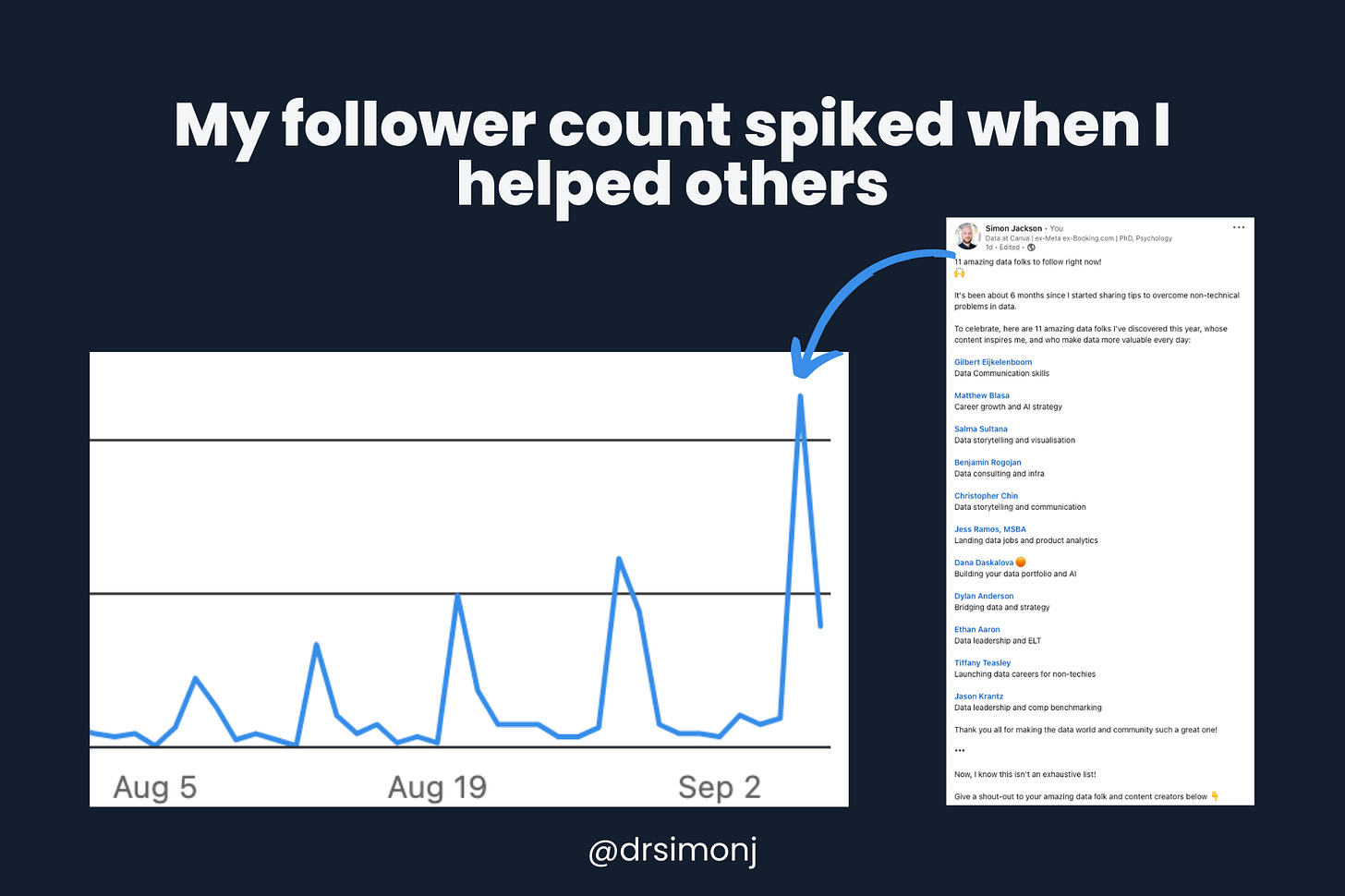How to accelerate your data career by helping others
Advice for every level of expertise
This week reminded me of something I care about: the value of helping others.
The catalyst was this LinkedIn post where I gave a shout out to 11 amazing data people. I did it because I’ve been learning from them and felt that others in my community might too! What I didn’t expect was what you see below: a massive spike in new followers.
In this newsletter edition I’ll share stories of how I’ve helped data peers and, in return, accelerated my career. I’ll also share advice for those of you who feel they’re not able to help others.
Why is this important
People have discouraged me from helping others in the past.
When I was an early-career academic, a professor told me to stop teaching other students how to code. Why? Because they said I was wiping out my advantage and wasting time I could have been using to write more papers. In other words, I should have been competing with my peers, not collaborating.
It was one of a few experiences that led me away from academia. I don’t see the world as a zero-sum game. One person’s success doesn’t need to be another’s failure. I have always enjoyed helping others because everyone benefits.
What landed me a job as a Data Scientist
As I was wrapping up in academia and learning more about data science, I was so passionate. I was learning all this new amazing stuff but had no one to talk to. So I turned to the internet, and I shared.
I started posting learnings on Twitter. I wrote and contributed to open-source code on GitHub. I started a blog (not this one). I even spent a few minutes a day answering questions on StackOverflow.
People started writing to me. I’d get follow up questions and also a lot of thanks. I’d even get other students and academics come up to me at events and say they read my blog or something and it helped them. It was, and continues to be, a motivating thing for me to help others in this way.
What I didn’t realise is that my internet presence had become my portfolio. I’d never had a job as a data scientist and I was failing to get anywhere applying with my CV. Until, one day, a recruiter contacted me. How?? They found me as a top-rated candidate via StackOverflow. I ended up taking the job,
Helping others launched my career in data science.
What got me promoted to Senior Data Scientist
To be a Senior Data Scientist you must be a craft expert who uplifts the skills and value of peers in your company.
When I started out as a data scientist, I noticed that a lot of my peers were using R but struggling. I dove in to help. I setup a training course and took my data peers through rigorous upskilling. I also turned a lot of my routine code into packages that became default inclusions for all R users at the company.
A peer shared feedback that work that often took them over 20 minutes now took them 2 minutes thanks to my help. That’s a 10x speed up. When you've got over 100 data scientists using R, that’s a significant uplift in the pace and quality of data work!
If I’m being honest, I never set out with that in mind. I enjoyed helping others learn. Seeing them do better was very rewarding for me. I also became better myself. Teaching solidified patterns, exposed me to interesting questions, and improved my public speaking.
This ended up being a defining factor in my promotion to Senior Data Scientist.
What got me promoted to Senior Data Science Manager and beyond
I hope that the value is clear to you by now. Similar stories litter my journey to data science manager, promo to Senior, and now PM.
So here’s why I see helping others as a career accelerant. By helping others, you:
Scale yourself to solve more and bigger problems than you can alone
Enhance your existing skills as you’re forced to articulate them
Expand your skills as you learn to share and new things from those you help
Interact with and become visible to others
There’s more but these are core ones for me.
I don’t think I can help others. What do I do?
Mental blocks to helping others is common (I’ve had them myself). Feelings of imposter syndrome or comparing yourself to more advanced peers. Let me try to persuade you to ignore these thoughts.
We all have something to share and people to help. Every time I’ve learned something, there’s plenty of people a few steps behind me I can pull up by sharing. They mightn’t be right in front of me but they’re out there.
We don’t know what other people find valuable. I’ve often stopped myself from sharing because I thought “oh, that’s stupid, of course everyone knows that.” Only to later find out that a lot of people would have found it useful to hear.
There are many ways to help people beyond sharing your knowledge. You can take notes, give feedback, repost content, prepare slides, whatever.
If this hits home, I have a challenge for you. Next week, block 15 minutes in your calendar to try one small act of helping a peer. Share a paragraph about something you did or learned, offer to help someone do their work, or give a shout out.
It will amaze you how something so simple can put so much value into the world. Plus, if you need someone to encourage you, reach out. You can tell me what you'd like to do and report back how it went. I promise to be encouraging and helpful!
You got this 👊



